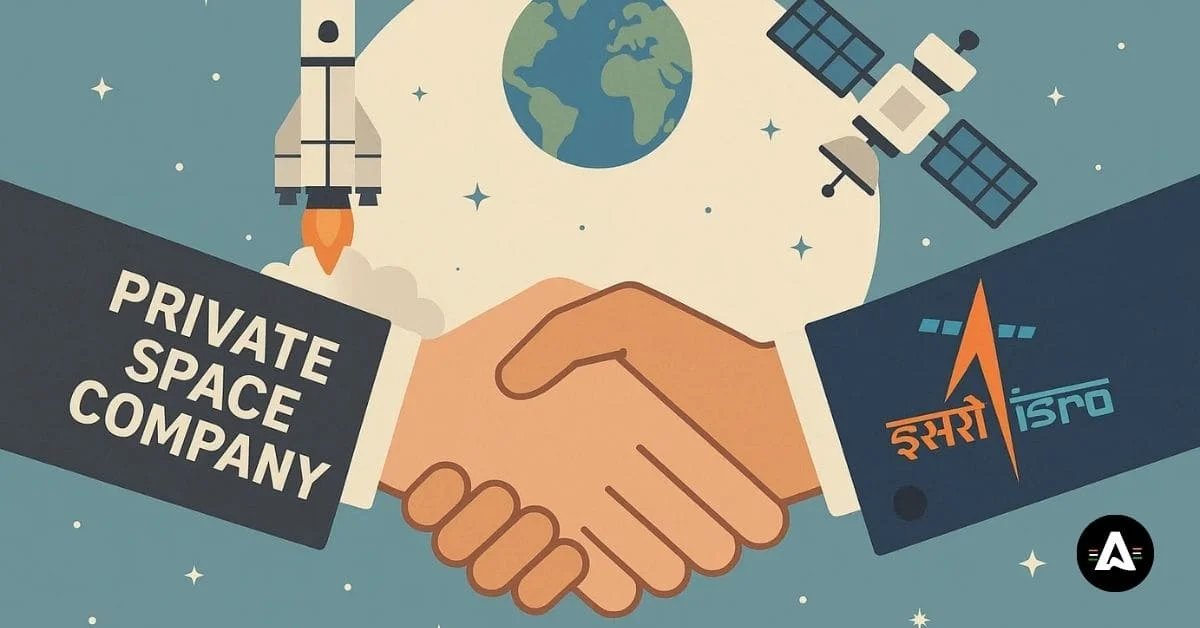Understanding IN-SPACe: For Private Players in Space Tech

IN-SPACe is the Indian National Space Promotion and Authorization Center. It was set up in 2020 to help private companies and grow the space sector in India.
It makes it easy for private companies to work with the Indian Space Research Organisation (ISRO). This helps startups and others that take part in space activities and builds a better system for space research.
The group gives private companies use of ISRO’s buildings, their technical know-how, and some help with rules and laws. This way, people can use new ideas for space technology.
India wants to take the space economy from $8 billion to $44 billion by 2033. They plan to do this by having public and private groups work together.
IN-SPACe also pushes for global teamwork and helps private companies get ahead with local space infrastructure and new ideas made in India.
Introduction
India’s space programme has grown a lot over the past few years. The indian space sector is now seen as a big name in space technology across the globe. As india’s space programme moves ahead, private companies in india now help a lot in launching satellites, building them, and giving space-based services. This change has brought about many new ideas and pushes the technology in the indian space sector forward. To let this happen, IN-SPACe was formed, so ISRO and private companies can work together. Because of this, a new time began for india’s space programme and the indian space sector.
The Evolution of India’s Space Sector and the Rise of Private Participation
India began its space journey more than fifty years ago. At first, the main aim was to use space to help people with the problems they face every day. The Indian Space Research Organisation, also called ISRO, led much of this work. They did many space activities like the Chandrayaan and Mangalyaan missions. These missions showed that India can do very good work in space research. Now, space in India is about more than just science. There is a big push for new space activities that help the country’s economy. This move fits with India’s plan to grow its space programme and work with other countries and companies.
Private companies take a big part in space activities in India now. Since the 2010s, more than 200 startups have come into the space sector. They work on things such as making satellites, building launch vehicles, and working on propulsion systems. By letting private companies take part, India hopes to move faster with new ideas in space. This step can help India build a strong place in the world for itself. A group called IN-SPACe is a good sign of this new way. Now, the government shares its know-how with private groups which bring fast thinking and new skills in areas like AI. Both the government and these private companies can gain something and grow from working together in the space sector.

Key Milestones in India’s Space Journey
India’s space exploration story is inspiring. The Department of Space and ISRO have led the way. In the early years, they worked on launching satellites that helped with weather and communication. This work set the base for bigger projects like Chandrayaan-1, which was India’s first mission to the moon in 2008. Achieving these milestones made India a strong and trusted name around the world in space activities.
ISRO has grown into a big player in the market. The change has been important for India. In 2013, ISRO launched the first Mars orbiter mission, called Mangalyaan. This showed the world it can do space activities between planets without spending too much money. The Department of Space also helped India get stronger ties with other countries. It did this by launching international satellites on Indian rockets. Because of this, India’s money from space exports has gone up.
Year | Milestone |
|---|---|
2008 | Chandrayaan-1: First lunar mission |
2013 | Mangalyaan: Mars orbiter mission |
2022 | Vikram-S: First private rocket |
2024 | Agnikul launched a 3D-printed engine rocket |
The milestones show that India can come up with new ideas in space. The country does this in ways that help people and also help business. This proves that india is good at finding new ways to work in space and make money from it too.
Drivers Behind Increased Private Involvement
India is now bringing more private companies into the space economy because there is a need for new ideas and faster growth. The country has more than 200 space startups. These work in different areas like making satellites, green technologies, and building small rockets. Skyroot caught many people’s attention in 2022 with its Vikram-S rocket. This showed how much India has grown in the space industry. All this change helps India to keep up with the growing need for space services around the world. It also helps the country work towards its big goal of reaching $44 billion in the space economy.
Several key factors are driving this growth:
- Policy reforms: Initiatives like IN-SPACe have made the rules clearer and simpler. This lets private companies be more active in space projects. These changes help indian startups work more with the space sector.
- FDI incentives: Now, there is a 100% foreign direct investment allowance. This makes it easier to get money from outside india. It gives more financial help for indian space startups.
- Access to ISRO facilities: Companies can use ISRO buildings and tools. Because of this, they can do better research and cut down on how much they spend. This is very helpful for new businesses.
- International collaborations: When indian startups work with partners from other countries, they reach more customers. This opens the way to new markets and brings in more money, which helps them grow.
These smart moves help to push India’s space economy ahead. They also give startups a bigger place in the world space industry. With all this, India and its startups stand out in the space economy.
What is IN-SPACe? Indian Space Policy
IN-SPACe, or the Indian National Space Promotion and Authorization Center, is a key part of the space sector in India. It started in 2020. The main work of IN-SPACe is to help private companies and connect them with the Department of Space. With IN-SPACe, non-government groups now have the chance to use space resources made by India. IN-SPACe helps bring new ideas, while making it easier for private companies to work with all that the Indian space sector has built.
The main work of IN-SPACe is to make space activities easier. It helps private companies to get approval for their work. IN-SPACe also supports the idea that people and businesses should share spaces and tools. By joining hands with ISRO and private companies, IN-SPACe lets India move forward in space technology. This helps India get closer to being a top country in space technology.
The Vision and Mission of IN-SPACe
IN-SPACe wants the space sector in India to get bigger. They want public and private groups to work together with no trouble. Their goal is to make India strong in space technology all over the world. IN-SPACe hopes to build a place where both startups and big companies can join in space activities. These activities include satellite launches, data analytics, and working on engines and parts that help move things in space.
The mission of IN-SPACe has a few parts. It wants to help private people and their groups take part in space activities. It also gives approvals for these space activities and shares good advice with new businesses. With this plan, Indian ideas and hard work in space can keep up with the top ways and standards in the world.
By doing this, IN-SPACe gives more chances to Indian startups and other businesses in India. It helps make India a better place for space technology growth. These steps help make hard things like the high cost of satellite launches easier. This also helps to grow the space economy in India.
Organizational Setup and Governance
IN-SPACe is part of the Department of Space but works on its own. This makes sure space work is clear and not confusing. It lets the government share its knowledge with private businesses, which makes the work better for all. There is an independent chairman who leads the agency. The agency gives out licenses, puts rules in place, and helps companies build new skills.

The rules for running things are strict and must be followed closely. These rules go along with national safety standards. This is to make sure private players do all the right things in a safe and green way. The agency uses audits and clear steps to keep the public’s trust. All of these things show that what the agency does is right and honest.
IN-SPACe brings Indian startups together with ISRO. This helps the new businesses and ISRO work better as a team. They use the same infrastructure and can ask for help with technical problems. IN-SPACe also gives useful policy advice. The goal is to help startups earn money and support the country’s growth.
How IN-SPACe Facilitates ISRO Collaboration with Private Sector
IN-SPACe connects the skills of ISRO with what private companies want to do in India’s space sector. This helpful move helps bring people together and sparks new ideas. IN-SPACe gives startups and other businesses the chance to use ISRO’s top labs, get technical help, and look at a lot of data. When they get this support, they can grow their work and try out new space technologies. This idea is a lot like online learning at InSpace, where people focus on teamwork and joining the community.
The work that IN-SPACe brings together covers joint projects, sharing technology between different people, and helping both people and groups grow in what they do. With this teamwork, private companies give a lot of help to India’s space goals and also to new things happening in space around the world. This close connection is key to growing the space economy and pushing the development of space technology in India and beyond.
Along with giving companies access to many resources, IN-SPACe also acts as a place where people in the industry can learn and grow together. Private companies get support from ISRO’s knowledge and tools. This helps them grow faster in the space technology field. These companies then take part in building the future of space technology in India and around the world.
Policy Support and Regulatory Guidance
IN-SPACe stands for the Indian National Space Promotion and Authorization Center. It is very important for new private companies in the space sector in India. IN-SPACe gives policy support and makes sure that what these companies do matches national goals. This helps create a good environment where startups can grow. The center makes rules simpler. It also cuts down on the red tape that often gets in the way. Because of this, startups in India can work on new ideas without getting stuck doing paperwork all the time. These steps have made it much easier for private companies to start working on projects in the space sector.
IN-SPACe helps startups and other groups join the space industry by making its licensing rules clear and simple. This makes it easier for them to take part. IN-SPACe also has ways to handle risk and keep everyone safe during space missions. These steps make sure that all people involved feel secure when they work.
To help startups grow, IN-SPACe offers money through seed funding. This pushes people to invest more and helps bring new ideas into the sector. IN-SPACe also follows space debris rules, which shows they care about doing things in a safe and right way. This focus on responsibility is good for the future of space work.
These rules help people and companies work together in the space sector. They also help make India a top place for space activities and new businesses. IN-SPACe helps build a space where new ideas can grow and technology can get better. This is important for India’s path to become a leader in space, both in India and around the world.
Access to ISRO Facilities and Technical Expertise
IN-SPACe, a new effort by the Indian Space Research Organisation (ISRO), lets private companies use its top-level equipment and know-how. Now, private companies and startups in the space sector can use things like satellite testing labs, launch pads, and telemetry stations. This can speed up how fast these startups grow in the space sector. Since they do not have to spend so much money on their own buildings or machines, they can use their resources for new ideas and development in space research. This helps make space research and work in the Indian space sector better for everyone.
ISRO’s mentorship programs help businesses with different things in space research and new technology development. The people in these programs share ideas about how to design propulsion systems, make satellite parts, and other skills that are important for this field. This kind of support helps people to be creative and lets companies grow their ideas in a better way.
The steps taken by ISRO help companies work together on big projects in space research. These plans let companies take part in important space missions with other countries. This helps India be seen as a main part of space exploration and the business around it. By using what ISRO knows and the tools it has, these companies can join in on new discoveries. They also help India stand out more in space research and its role in the world.
Conclusion
In the end, IN-SPACe is a key link between ISRO and private companies. It helps the space sector in India get bigger and move forward by bringing in new ideas and fresh ways to work. IN-SPACe has a clear purpose and plan. It lets private groups use all the useful things ISRO has. It also gives good advice on policy and helps with technical support.
This teamwork makes private companies stronger. With this, they can help more in the country’s space work. Now, more startups work with IN-SPACe. This shows that the space sector in India will get better and keep growing. Everyone in this space will see more progress. India will take bigger steps in the world’s space field.
If you want to see how IN-SPACe can help with your ideas, you should ask them for more info about how to work together. This time is good to be part of the fast-moving space sector in India. With help from ISRO and IN-SPACe, you can get the support you need.
Frequently Asked Questions
IN-SPACe is an independent group set up by the government under the Department of Space in India. It helps private sector companies who want to join in space activities. IN-SPACe gives approval, offers technical support, and keeps an eye on all the work done with the Indian Space Research Organisation. This team makes it easier for people and groups in India to take part in space research.
IN-SPACe helps startups and private companies that want to do space activities. It gives approval for what they want to do in space. IN-SPACe also lets them use technical resources from ISRO. Startups get options for seed funding. The program gives advice and sets rules, so these companies can do well in space technology. This makes it easier for them to work and grow in this field.
Private companies can send their applications to IN-SPACe by filling out the online form. They have to give details about their project. It is good to follow the national rules for this. These companies can also show if they want to work together with ISRO in the space sector.
Yes, IN-SPACe helps with international partnerships. It does this by giving rules and support for working with other governments or outside groups. This help makes it easy for private companies in the space sector in India to grow. They can reach more people and make more money in other countries. It also helps the space sector in India get stronger.
IN-SPACe has changed the way space technology is used in India. It has helped more private groups join in the work. So far, there have been over 45 MoUs signed. These deals have helped new ideas grow, and supported many startups. This has made more jobs, new and better tech, and more work with other countries possible. All these things help India go forward and try to be a top leader in space technology around the world.




